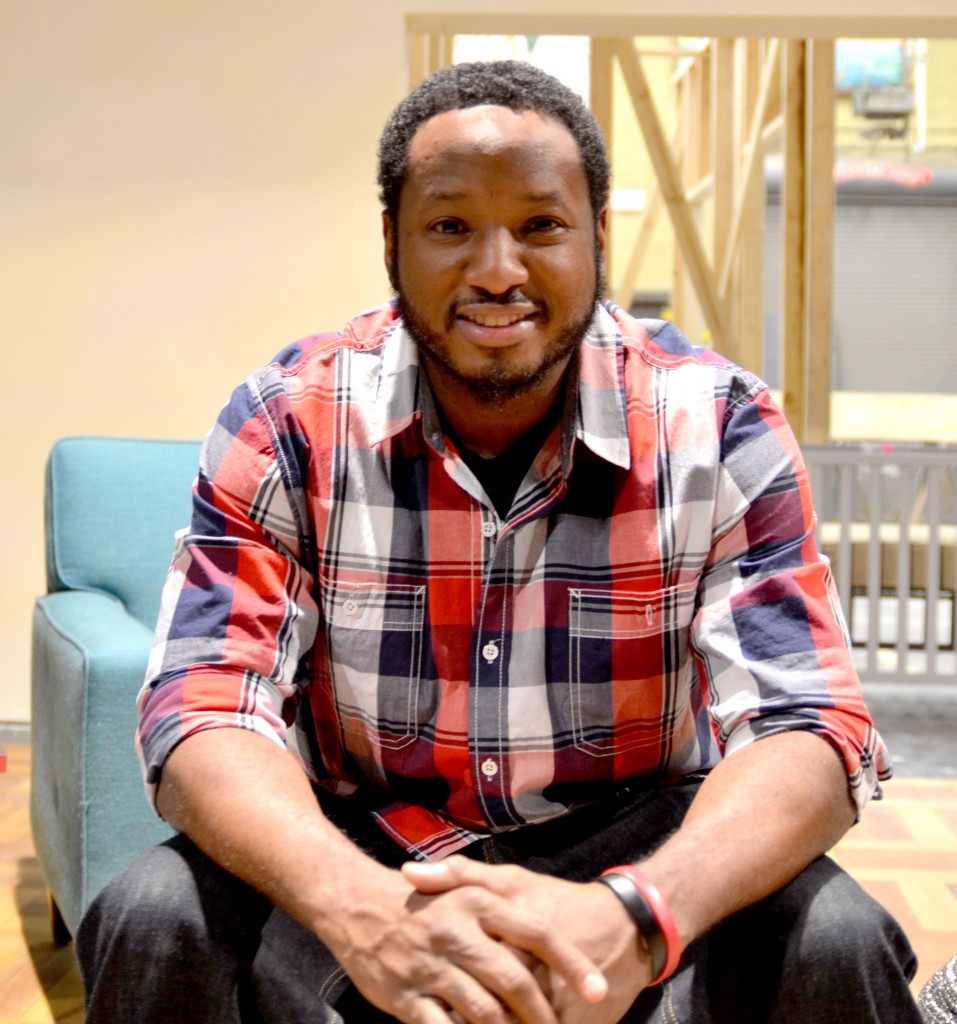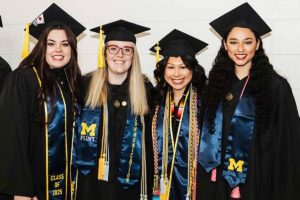
Kenyatta Brown is a senior majoring in Africana Studies and minoring in Theatre. He is playing the role of Alemu, an immigrant from western Africa, in the upcoming UM-Flint production of The Call by Tanya Barfield.
Thanks to his courses in Africana Studies, Kenyatta was able to bring unique insight to the role. His own personal experiences from family life and growing up in Flint also helped to enrich his portrayal. Read on as he discusses his role in this new production.
How did you connect with this character?
When you get a character, one of the exercises that most directors will do is have the actors give that particular character a backstory. The backstory is the thing you think the character was doing before this particular box of two hours happened. What was this character doing before this happened? Why is this character like this? What happened in this character’s life? Because we all have a turning point in our lives that makes us think a certain way and act a certain way. So creating a backstory for Alemu—definitely my Africana studies helped me. Because of the genocide in his country, the guilt that he carries because he made it out—it’s kind of similar to how I felt growing up here and then going away to the Navy. I grew up in a rough neighborhood—so my friends were kind of stuck doing the same thing. When I came home to visit, I kind of felt guilty. They would see me and think ‘oh, you’ve got it going on,’ which I didn’t, but to them I did.
Another thing in the backstory, I try to find similarities to me and the person, the character. One similarity is that Alemu’s father had died of sickness and my father died of cancer. There’s a part in the story where he’s wishing he could do something, but there is nothing he can do—same here, you know? So, that allowed me to kind of feel where Alemu was coming from.
How do you feel about this role?
It’s funny because with this role there were so many qualities that I could relate to in him. But then, on another note, it was very challenging because of things like the accent. He’s a little weird, so he brings a little comic relief, but I don’t want him to come off as stupid or just as the ‘funny guy.’ That’s my goal for the character. You have to walk that thin line and you have to be careful. Because you want to portray the right thing—what you want the audience to get.
How do you feel about the ambiguity surrounding some of this play’s characters and situations?
That’s the beauty of this playwright. She doesn’t answer any questions. So I think this particular play is a great play to come and see. Especially if you like to debate afterwards or if you like to have a dialogue with those you’re with when you see it. It’s a good piece for conversation. She leaves it out there, and there are so many issues in this hour and thirty minutes!
I’m excited about the last day that we perform, that has the Q & A session [with the audience] afterwards. I’m curious about what people will ask. All she says is that Alemu is from West Africa; she doesn’t say what country. It’s not just his character that’s ambiguous; there are five characters and for each there are questions that can still loom after the play.
What advice do you have for audience members?
Come with an open mind, because it will benefit you. Be open to things that you don’t agree with—lifestyles you don’t agree with, or cultures that you don’t necessarily get into. Just come open.
What did you take away from this role and this play?
This play made me think about trust. In Flint the term “genocide” is floating around with the water issue. I thought about things like the Tuskegee experiment. When the people don’t trust the powers that be, there’s something happening within that. It’s a scary thing sometimes.
I dug deep into this. I thought, ‘What if I didn’t have the water issues here? Would I have dug so deep?’ Being human, I had to ask myself that. I have to check myself in a way, wondering if I am as sensitive to others as I need to be.
What has it been like being a student of Africana Studies and Theatre?
For me, it’s great and it’s challenging, too, because I’ve been away from college for some years and just came back this year. From the Africana Studies standpoint, it’s great, just learning more about my culture that I didn’t even know, which I love.
It’s learning about the thing that I love and who I am, and then learning about what I love to do. . . Combining the two is perfect. I think this play, for me, it came on time. Opening night is my father’s birthday. I haven’t been on the stage in three years. In LA, I was doing film and TV, too, but I got custody of my daughter three years ago and theatre takes a lot of time. So this is my first play being back on stage, on his birthday. So, I’m excited.
The Call opens on January 29 and runs on select days through February 7, 2016. For show times and ticket information, visit umflint.edu/theatredance and click “current season.”
There will be a Special Discussion with the Director on Wednesday, February 3, at 2pm in the Thompson Center for Learning & Teaching, 134 Thompson Library. Join in to learn about the play and gain insight into the artistic choices used to present this dynamic story.




